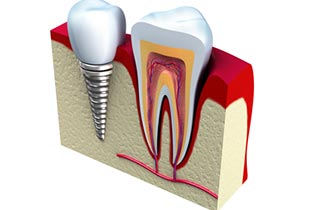Dental implants are the ideal way to replace a missing tooth or teeth. With its help, the original chewing ability in the given area can be restored to 95%. The method of implantation has evolved a lot in recent decades, with the success rate of implantation approaching 100%. In this article, we explore the negligible dangers of implantation and the circumstances that preclude or aggravate it.

- What is a dental implant?
- When are dental implants contraindicated?
- What are the risks and hidden dangers of dental implants?
- Can dental implants cause problems years later, can anything go wrong?
- What factors should you consider when choosing dental implants?
What is a dental implant?
It is one of the methods for replacing missing teeth. The dentist inserts an artificial root made of titanium in the patient’s jaw. After a healing period, he places on it a prosthetic crown matching the other teeth. A dental implant offers numerous advantages: the replacement of missing teeth prevents the loss of bone and with proper care, a dental implant can even last longer than your teeth. An implant can save you from using dentures, your digestion will improve. Besides medical benefits, your general appearance gives you back your self-confidence.
When are dental implants contraindicated?
As with other interventions, it is true of dental implants that a patient’s untreated or severe underlying disease has a serious impact on the success of the implant. In particular, the following diseases may be considered as risk factors or reasons for exclusion:
In the case of heart diseases, in the case of tumours, in the case of certain autoimmune diseases, in case of mental health problems, in the case of advanced osteoporosis, in case of a neglected habit of gnashing one’s teeth, Severe bone deficiency
In the following cases, dental implants are possible but special care is needed:
Diabetes, alcoholism, strong smoking,or pregnancy.
What are the risks and hidden dangers of dental implants?
Dental implants are generally safe and have a high success rate, but there are some hidden risks and complications to be aware of:
- Infection (Peri-implantitis): Bacteria can accumulate around the implant, leading to gum inflammation and potential bone loss. Poor oral hygiene, smoking, or pre-existing gum disease increases the risk.
- Infection or nerve damage in the short term: If the implant is placed too close to a nerve, it can cause pain, tingling, or numbness in the lips, gums, or chin (sometimes permanent).
- Infection and short-term sinus complications: If placed too close to the sinus cavity, an implant can puncture or put pressure on it, leading to sinus infections or chronic discomfort.
- Infection or allergic reactions or metal sensitivity: Some people have reactions to titanium implants, leading to inflammation or systemic symptoms.
- Implant rejection or failure: The body may reject the implant, or it may fail to integrate with the jawbone (osseointegration failure), requiring removal.
- Infection, misalignment or jaw pain: Poorly placed implants can affect the bite, causing discomfort, TMJ (temporomandibular joint) issues, or uneven pressure on other teeth.
- Infection, or micromovements leading to failure: If an implant moves too much before full healing, it may fail to integrate with the bone properly.
- Infection costly dental implant repairs or replacements: If complications arise, additional surgeries or bone grafts may be needed, leading to high unexpected costs.
Can dental implants cause problems years later, can anything go wrong?
Yes, dental implants can cause problems even years after they are placed. Although they are designed to be a long-term solution, complications can occur over time, including:
- Peri-implantitis (late infection): Gum disease around the implant can be a lifelong problem, not just after surgery, and can lead to inflammation, bone loss, and eventual implant failure.
- Bone loss around the implant: Over time, the bone supporting the implant can deteriorate, making the implant unstable. This can be caused by peri-implantitis, excessive pressure from biting, or natural ageing.
- Implant loosening or fracture: Excessive force from grinding (bruxism) or trauma can cause the implant or crown to crack or break. In some cases, the screw inside the implant may loosen, requiring professional adjustment.
- Long-term sinus problems (for maxillary implants): If the implant is placed too close to the sinus cavity, long-term pressure can cause chronic sinus infections or discomfort.
- Nerve damage (permanent or delayed symptoms): If an implant is placed near a nerve, it can cause tingling, numbness, or pain that can last for years. This is rare, but in some cases, it can be permanent.
- Allergic reactions or systemic symptoms: Some people may develop a sensitivity to titanium, which can lead to inflammation or systemic symptoms such as fatigue or headaches. Zirconium implants are an alternative for those who are sensitive to metals.
- Aesthetic problems (gum recession or crown wear): Over time, the gums can recede, exposing the metal part of the implant and affecting its appearance. The crown can also wear out or become discoloured, requiring replacement.
How to prevent late-stage implant problems?
- Maintain excellent oral hygiene (brushing, flossing, and regular cleanings).
- Avoid smoking and excessive alcohol consumption, which can weaken bone and gum health.
- If you grind your teeth, wear a mouth guard.
- Visit your dentist regularly for checkups and X-rays to catch problems early.


